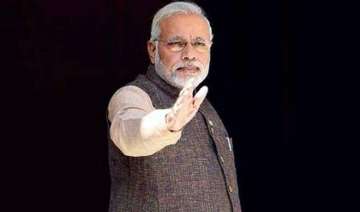Demonetisation: Frequent rule changes was to stay ahead of our enemies, says PM Modi
Prime Minister Narendra Modi has strongly defended his move to demonetise higher currency denominations, calling it a "difficult" but apolitical decision

Prime Minister Narendra Modi has strongly defended his move to demonetise higher currency denominations, calling it a "difficult" but apolitical decision that was taken to rid the Indian economy and society of the "menace" of black money, corruption, and terrorism.
In his first interview after his November 8 demonetisation announcement, Modi told weekly India Today that India was standing at a "watershed moment" and the move to scrap 86 per cent of the currency in circulation was to cleanse the nation "from all forms of filth".
He shrugged off all criticism against the move as he spoke about the impact of the demonetisation of high-value currency notes of Rs 500 and 1,000 on the economy, the government's future action plan and how he saw Opposition's protest against the note ban.
He said the money that was with terrorists, Maoists, and human traffickers "has been neutralised".
"Black money has all been forced out into the open, whomsoever it may belong to -- whether it is corrupt politicians, bureaucrats, businessmen or professionals. Counterfeit notes, which our intelligence agencies had reported to be available in high volumes with our enemies, have been instantly neutralised."
Regarding frequent modifications in government decisions following the announcment, Modi said it was done strategically to nullify any attempts to convert black money into white. "It was stay ahead of our enemies," PM Modi said.
"You must be able to distinguish between niti (policy) and ranniti (strategy). Our strategy, however, needed to be different."
He said the decision, which has caused an unprecedented cash crunch in the country and disrupted economic growth, was taken "not for some short-term windfall gain, but for a long-term structural transformation".
"There is nothing political in the demonetisation decision... it was a tough decision taken to clean up our economy and our society. If I were guided by short-term electoral politics, I would have never done so," Modi said.
"Our objective clearly was to clean our economy and society of the menace of black money, purging the distrust, artificial pressures and other ills that came with it."
He took a dig at former Prime Minister Manmohan Singh over his reference to "organised loot" during his speech on demonetisation in Parliament and said it must have been in the context of his own UPA government.
"Regarding Manmohan Singhji, it is interesting that the words 'monumental mismanagement' came from a leader who has been at the helm of India's economic journey for around 45 years," Modi said.
"His reference to organised loot was perhaps a reference to the unending string of scams under his leadership... From the coal scam, to 2G and CWG scam. Demonetisation, on the other hand, is an unprecedented step to confiscating the loot of the corrupt."
He said the decision was so big that even "our best economists remain confused in their calculations".
But "India's 1.25 billion citizens, however, have welcomed it wholeheartedly and supported it even in the face of great personal difficulties, intuitively understanding its impact and importance", he said, referring to cash chaos that followed the move.
He said he pitied his opponents, especially the Congress leadership, for their criticism of the move.
"On the one hand, they say I took this decision for political dividends, and on the other, they say the people have been troubled and are deeply unhappy. How can the two go together?
"If one does an unbiased, objective evaluation of my government's programmes and priorities over the past two and a half years, the one thing that will unambiguously emerge is the centrality of the poor, downtrodden and marginalised."
(With IANS inputs)